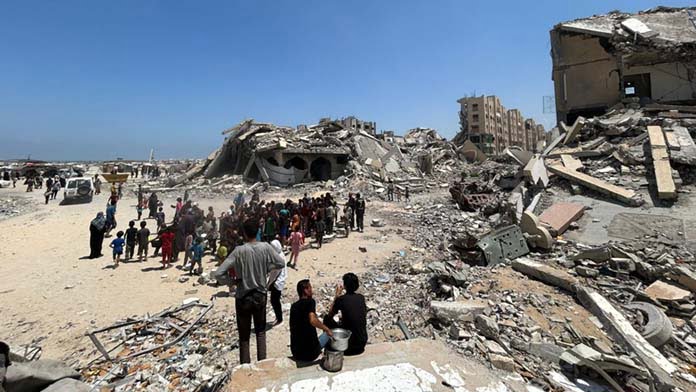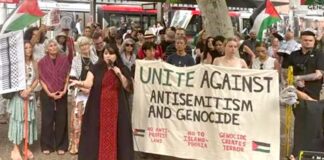Israel has failed to achieve its goal of eliminating Hamas after nine months of war and the butchering of 38,000 Palestinians in Gaza.
Israel and its governing coalition are in disarray amid huge protests. Prime Minister Benjamin Netanyahu’s war cabinet was dissolved in May amid increasing divisions. He and key sections of his government see expanding war into Lebanon as the only way to stay in power.
Israel and Hezbollah have engaged in tit-for-tat exchanges on the Lebanese border since Israel began its war in Gaza. But the push to escalate war on Israel’s northern border is now gathering pace.
In the first days of June Netanyahu made a speech while visiting border areas, saying, “We are prepared for a very intense operation in the north. One way or another, we will restore security…”
Now there are signs that the escalation on the northern border will move to a new level.
On 23 June Netanyahu said the end of the “intense phase” of the war in Gaza was “very close” and that Israel would begin to redeploy some of its forces to the border with Lebanon. The Israeli military said in a statement, “operational plans for an offensive in Lebanon were approved and validated”.
Then in early July Israel assassinated a senior Hezbollah Commander, Muhammad Nimah Nasser, also known as “Hajj Abu Nimah” through an air strike in southern Lebanon. Hezbollah responded by firing 200 rockets into Israel.
According to the Washington Post, the US has promised continued support for Israel in a wider war, despite making frantic diplomatic efforts to avoid escalation.
Hezbollah inflicted a humiliating defeat on Israel in 2006, driving them out of southern Lebanon. Their military capability dwarfs that of Hamas. They are reported to possess 130,000 rockets and missiles capable of overwhelming Israel’s missile defence systems.
Mass murder but no victory
Netanyahu has repeatedly pledged to achieve “total victory” over Hamas. In the face of intense pressure to secure the release of Israeli hostages, he used the goal of eliminating Hamas to justify rejecting a new ceasefire proposal in May.
But despite the massive destruction in Gaza Israel has failed to achieve this goal.
Hamas re-gained control over the southern city of Khan Younis in April after Israeli forces withdrew. Israel announced its withdrawal following fierce resistance and only days after a Hamas operation reportedly killed 14 Israeli soldiers. Israel has now issued another mass evacuation order, telling 250,000 displaced people to leave as it renews its attacks.
Israel has also had to launch new attacks in Gaza City’s Shuja’iyya neighbourhood, where Hamas re-asserted control after Israeli withdrawal, and has faced continuing resistance in Jabalia in the north of Gaza.
The Times of Israel reports Michael Milshtein, a former colonel in Israeli military intelligence, saying, “There is no vacuum in Gaza, Hamas is still the prominent power”. Hamas’ People’s Protection Committees openly patrol the streets of Rafah.
Stress
The protracted war in Gaza and the failure to defeat Hamas is widening fractures inside Israel.
Israel’s military has increasingly contradicted Netanyahu’s promise of total victory. In June the Israel Defense Forces’ top spokesman said “Hamas is an idea” and can’t be eliminated.
The losses inflicted on Israel’s military are considerable. From 7 October onwards they have reported 679 deaths and 4086 casualties and counting. Some other reports suggest injuries nearly double those of official statistics.
The New York Times published a damning article based on statements and interviews with Israeli military officials, reporting, “Nearly nine months into a war that Israel did not plan for, its army is short of spare parts, munitions, motivation and even troops”.
It continues, saying, “In an army largely reliant on reservists, some are on their third tour of duty since October” and that “Fewer reservists are reporting for duty”. Because of these pressures the Times says “Israel’s military leadership wants a ceasefire with Hamas in case a bigger war breaks out in Lebanon.”
A Supreme Court decision ending exemptions from compulsory military service for Israel’s million-strong ultra-Orthodox community has now also sparked angry protests.
Israel has succeeded in destroying Gaza and slaughtering immense numbers of civilians. But with this has come growing political instability and international isolation.
The outcome of recent negotiations in Egypt remains to be seen. If Netanyahu remains intransigent it will mean more division and instability, and make an attack on Lebanon more likely.
Israel’s growing crisis shows why it is right to support resistance and the necessity of a movement powerful enough to stop the US and other Western countries arming Israel. This support is what enables it to inflict terror on Gaza and threaten to spread the carnage to Lebanon.
By Adam Adelpour






